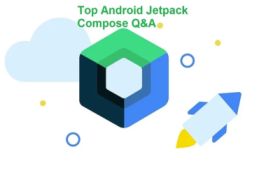Android Jetpack Interview Q&A
In this article, we will learn the best Android Jetpack interview questions and answers.
What is Android Jetpack?
Android Jetpack is a bunch of libraries, instruments, and design direction given by Google to assist engineers with building strong and viable Android applications. It includes components for common tasks like navigation, UI design, data management, and more.
What are the core components of Android Jetpack?
Android Jetpack is divided into four main categories of components: Foundation, Architecture, UI, and Behavior. Some core components include Room for database management, ViewModel for UI-related data management, Navigation for navigation between app screens, and LiveData for building data observation in a lifecycle-aware way.
How does ViewModel work in Android Jetpack?
ViewModel is one of the architecture components in Jetpack. It’s intended to store and oversee UI-related information in a lifecycle-cognizant way. It survives configuration changes and is independent of the UI components. Developers can use ViewModel to share data between different fragments or activities without losing the data during configuration changes.
What is the Room Persistence Library in Android Jetpack?
Room is a part of the Android Jetpack Architecture components and is a persistence library that provides an abstraction layer over SQLite to allow for more robust database access. It simplifies database interactions by providing annotations to define the database schema, and it includes features like LiveData and RxJava support for reactive programming.
How does the navigation component simplify app navigation?
The Route part in Android Jetpack works on the execution of routes in Android applications. It provides a visual editor in Android Studio to design navigation graphs, which represent the navigation flow in an app. It also handles fragment transactions, deep linking, and other common navigation-related tasks, making it easier for developers to manage the navigation structure of their applications.
What is a Composable function?
In the context of Android development with Jetpack Compose, a composable function refers to a function that is used to define a UI component in a declarative manner. Jetpack Compose is a modern UI toolkit for building native Android applications, and it allows developers to create UI elements by describing the UI hierarchy using composable functions.
What is LiveData in Android Jetpack?
LiveData is one of the Android engineering parts given by Android Jetpack. It is an information-holder class that is intended to notice changes in basic information and tell its eyewitnesses when that information changes. LiveData is especially valuable for building receptive and lifecycle-mindful parts in Android applications.
What is WorkManager in Android Jetpack?
WorkManager is a part of the Android Jetpack library that provides a flexible, reliable, and easy-to-use way to schedule and manage background tasks or deferrable tasks. It is designed to handle scenarios where you need to execute tasks, even if the app is not currently running, and to ensure that these tasks are executed under the best possible conditions, taking into account factors like device state, battery level, and network connectivity.
What is the Data Binding Library in Android Jetpack?
The DBL is a piece of Android Jetpack that permits engineers to tie UI parts in their designs to information sources in their application, utilizing a decisive configuration as opposed to automatically controlling the view objects. This works on the code and makes it more straightforward to keep up with and figure out the connection between the UI and the fundamental information.
Why do we use Jetpack on Android?
Android Jetpack is a set-up of libraries, instruments, and design direction given by Google to assist engineers with building current, vigorous, and viable Android applications. addresses common challenges faced by Android developers and offers a set of components and best practices to streamline development. Here are some key reasons why developers use Android Jetpack:
Architecture Components: Jetpack includes a set of architecture components like ViewModel, LiveData, Room, and Navigation that help developers design scalable, maintainable, and testable architectures for their Android apps. These components encourage the use of best practices such as separation of concerns and the implementation of the MVVM (Model-View-ViewModel) pattern.
Lifecycle Management: Jetpack provides components for managing the lifecycle of Android applications, ensuring that developers can handle activities and fragments through their entire lifecycle. This helps prevent memory leaks and ensures proper resource management.
UI Components (Compose): Compose simplifies UI development, encourages a reactive approach, and provides a more concise way to create UI components compared to the traditional XML-based layouts.
Data Management: Jetpack offers libraries like Room Persistence Library for local data storage and retrieval, as well as LiveData for building reactive UI components. These components make it easier to manage and observe changes in data, fostering a responsive and data-driven user experience.
Background Processing (WorkManager): WorkManager, part of Jetpack, simplifies the scheduling of background tasks, such as syncing data, performing periodic tasks, or handling deferred work. It takes care of managing task execution based on device and network conditions.
Navigation: It provides a visual editor in Android Studio, making it easier to design and manage navigation graphs.
Testing Support: Jetpack components are designed with testability in mind. Architecture components, in particular, make it easier to write unit tests for business logic and UI components. The suite includes testing libraries and tools to facilitate unit testing and UI testing.
Backward Compatibility: Jetpack is designed to be backward compatible, allowing developers to use modern features on newer devices while ensuring that the app remains compatible with older Android versions.
Consistency and Updates: Jetpack promotes a consistent development experience across different Android versions and devices. It also receives regular updates from Google, incorporating improvements, bug fixes, and new features to keep up with the evolving Android ecosystem.
Did you know Kotlin Collection was the most common topic on the interview panel? Need to brush up? Check out the link Kotlin Collection: A Developer’s Guide to Android Developers.



